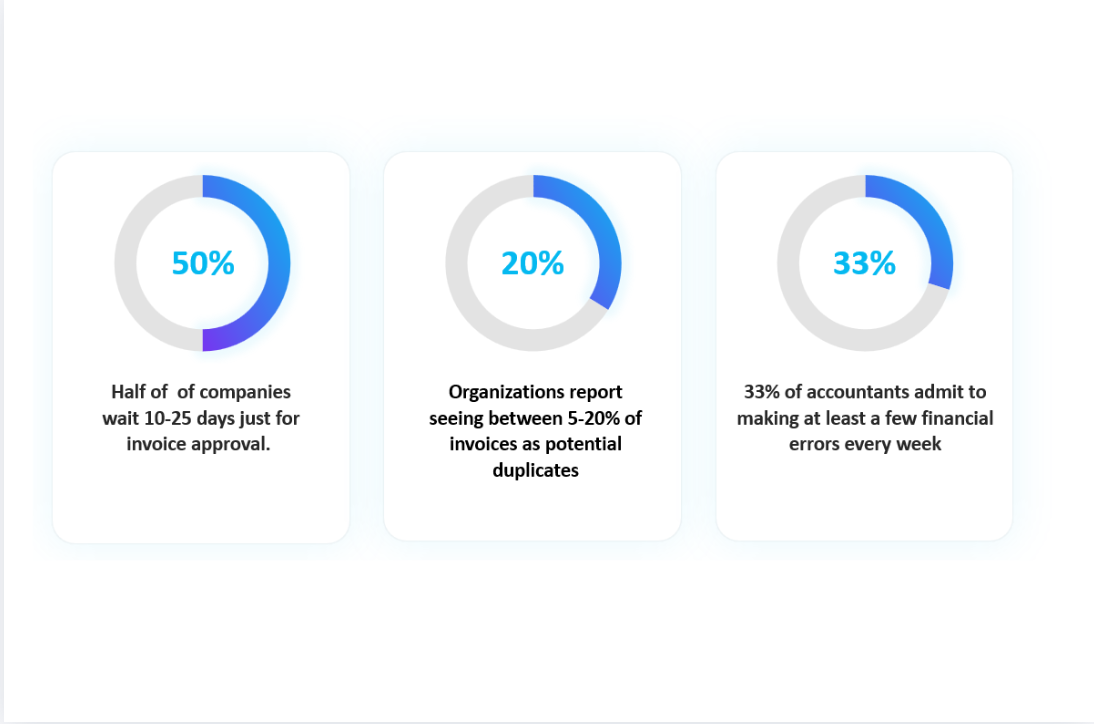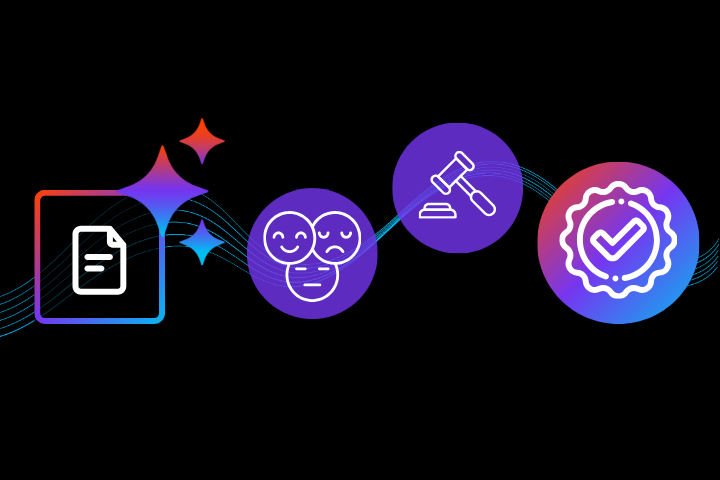Introduction
Artificial intelligence (AI) is transforming the way organisations connect with their customers. By making interactions faster, more personalised, and more predictive, AI is reshaping customer experience management (CXM). From automation to sentiment analysis, businesses are leveraging AI to understand customer needs, anticipate behaviours, and deliver personalised, meaningful experiences. Companies that use AI effectively are strengthening loyalty and creating a clear competitive advantage. In this article, we examine how AI is transforming CXM, the key applications driving this change, and the strategies businesses can employ to implement AI responsibly and effectively.
AI is essential for modern customer experience management
Today’s customers expect brands to know them, anticipate their needs, and deliver seamless experiences across every touchpoint. Generic communications or delayed responses no longer meet these expectations. To keep customers engaged, businesses need a more strategic approach to customer experience management.
CXM is the practice of designing, orchestrating, and optimising every interaction a customer has with a brand. When enhanced with artificial intelligence, CXM becomes more powerful, enabling organisations to analyse large volumes of customer data, personalise customer journeys, and automate responses in real-time. By combining machine learning (ML) with natural language processing (NLP), businesses can interpret customer feedback across channels and deliver consistent, personalised service. In short, this combination allows CXM to scale with both accuracy and speed.
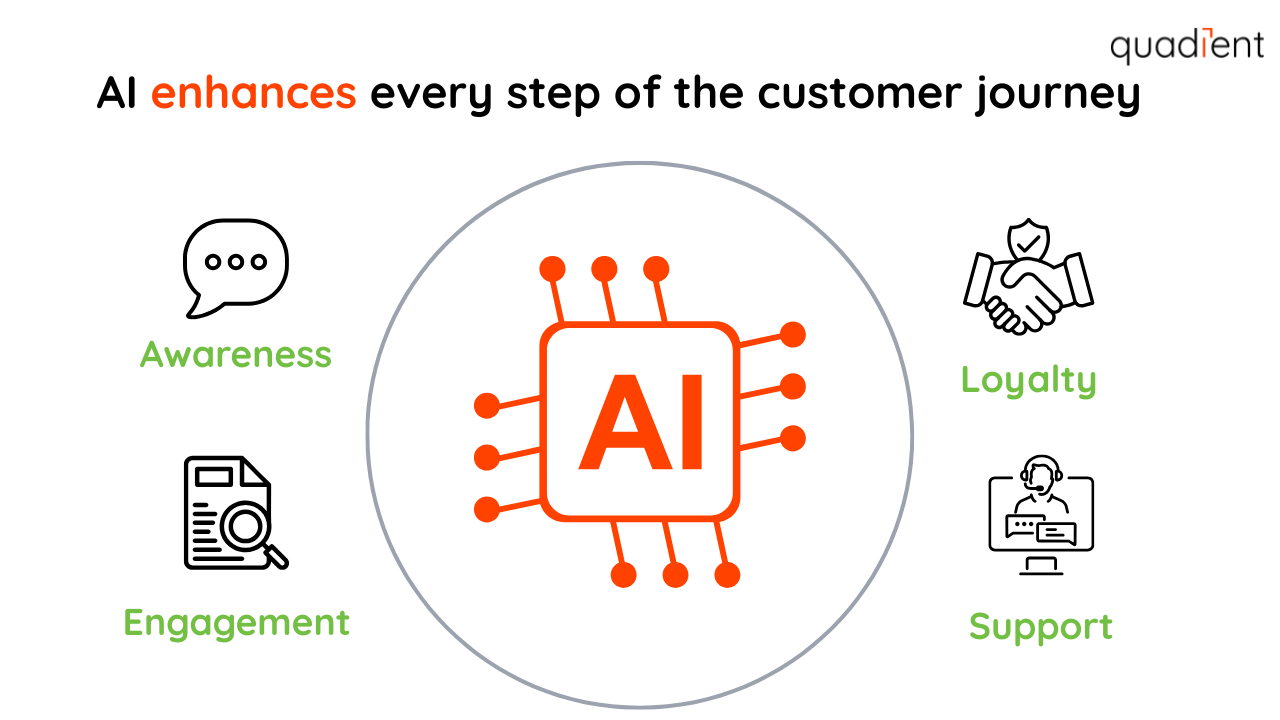
The competitive advantage is clear. Companies that adopt AI in their CX strategies are outpacing rivals by offering faster resolutions, personalised offers, and predictive support. Those that fail to adapt risk falling behind. Research shows that 41% of companies already use AI to differentiate their customer experience, and those that prioritise CX are significantly more likely to report market-share gains.
From reactive to proactive
Traditional approaches to customer experience rely heavily on surveys, call centres, and CRM systems that focus on historical data. This reactive model limits real-time insight and often leaves customer-facing professionals struggling to meet expectations.
Artificial intelligence changes that dynamic by enabling businesses to anticipate problems before they occur. Predictive analytics can signal potential churn, highlight the need for maintenance, or prompt timely communications that improve customer satisfaction. A utility company, for example, might use AI to send proactive notifications about planned outages, service disruptions, or unusual usage patterns. By keeping customers informed before they have to ask, businesses reduce frustration and build trust.
The shift from reactive to proactive service creates a powerful opportunity for long-term loyalty. By delivering tailored, consistent experiences across all channels, organisations can strengthen their relationships with customers. Insurers, utilities, and financial services providers are already utilizing behavioural data and customer-level transaction data to predict needs, enhance interactions, and foster advocacy.
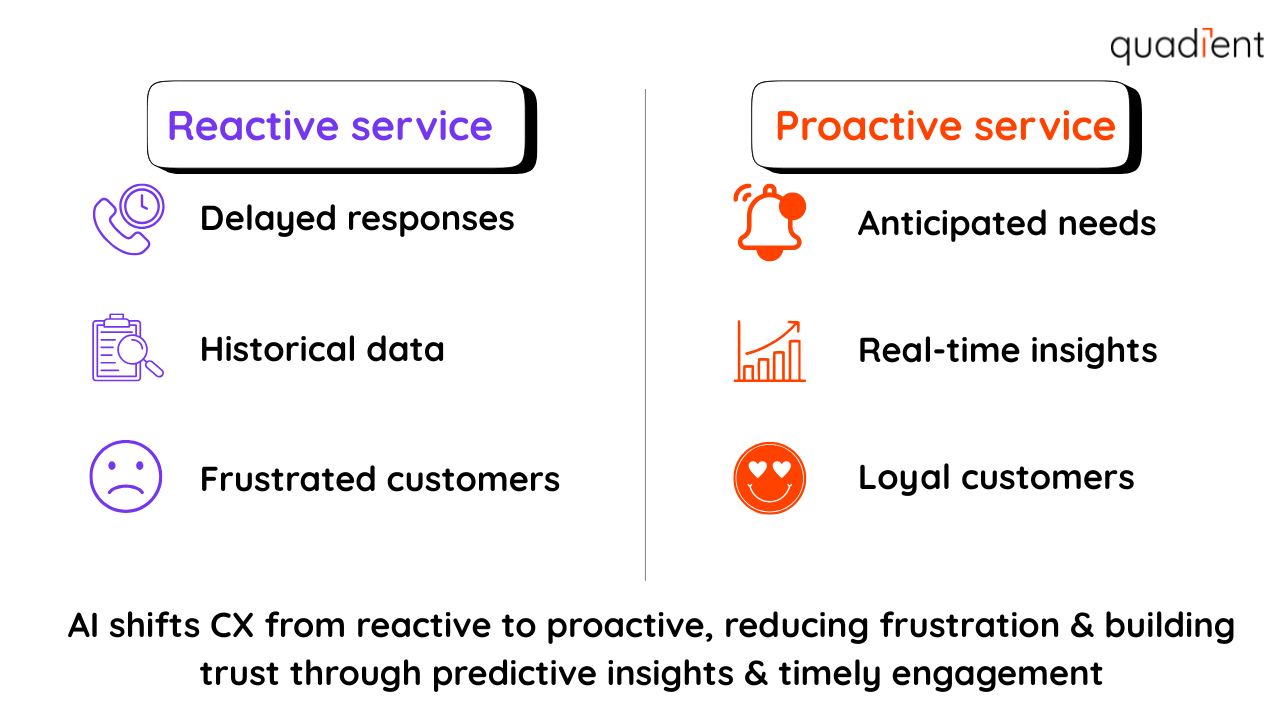
Key AI applications transforming customer experience management
Personalisation at scale: Understanding the individual customer
Machine learning allows businesses to analyse:
- Behavioural data
- Product usage information
- Customer profiles
This enables delivery of highly relevant recommendations and messages. Personalised statements and interactive bills are turning routine tasks into opportunities for meaningful engagement.
Intelligent automation for enhanced support and efficiency
AI chatbots and virtual assistants can handle routine queries instantly, thereby reducing wait times and allowing human agents to focus on more complex issues. This improves efficiency without sacrificing quality.
Predictive analytics for foresight and proactive engagement
Predictive models use past behaviours and real-time signals to anticipate needs. This enables companies to provide the right solution before a customer even requests it.
Sentiment analysis for deeper customer understanding
Sentiment analysis powered by AI tools helps decode customer feedback, online reviews, and social conversations. By identifying satisfaction levels in real-time, organisations can adjust their communications and improve customer interactions across both digital and human touchpoints.
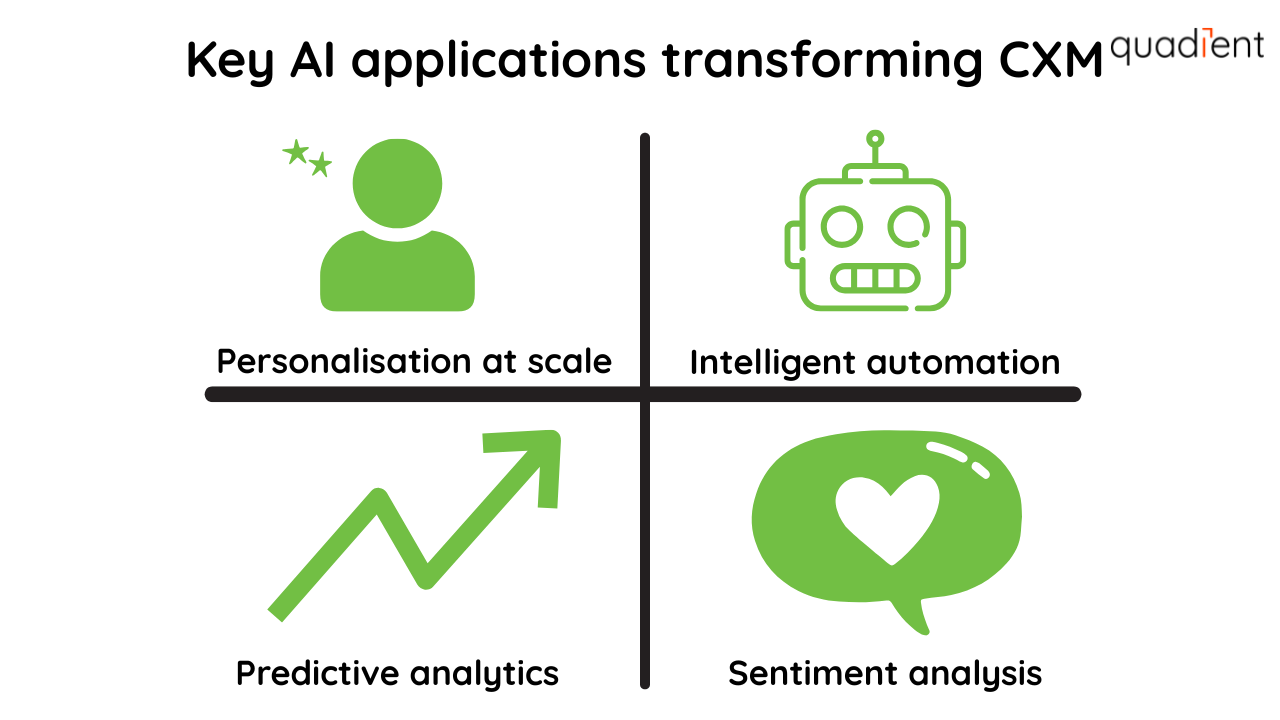
The transformative power of generative AI (GenAI) in CX
Generative AI represents the next step in technological innovation for CX. GenAI can craft natural responses in customer service, generate tailored product descriptions, or create personalised communication campaigns. This expands the possibilities for human-like, yet scalable, interactions.
Building an intelligent CXM engine
Artificial intelligence thrives on data, and customer experience management depends on having a complete, unified view of the customer. To maximise value, organisations must break down silos and connect CRM systems, customer-level transaction data, and behavioural insights into a single profile that captures every interaction.
With this foundation, AI can guide customers through personalised journeys and ensure smooth transitions across websites, mobile apps, call centres, and in-person services. Rather than running isolated campaigns, businesses orchestrate consistent, relevant experiences at every touchpoint.
A well-designed CXM engine delivers measurable business outcomes:
- Improved retention through proactive engagement and personalised service
- Higher cross-sell and upsell opportunities by analysing product usage information and user behaviour
- Reduced operational costs by automating routine tasks and optimising resources
- Enhanced workforce experience with AI tools that empower customer-facing professionals
By unifying customer data, orchestrating journeys, and measuring results, organisations create an intelligent CXM strategy that delivers both stronger relationships and tangible ROI.
The human-AI symphony: Augmenting, not replacing, the human touch
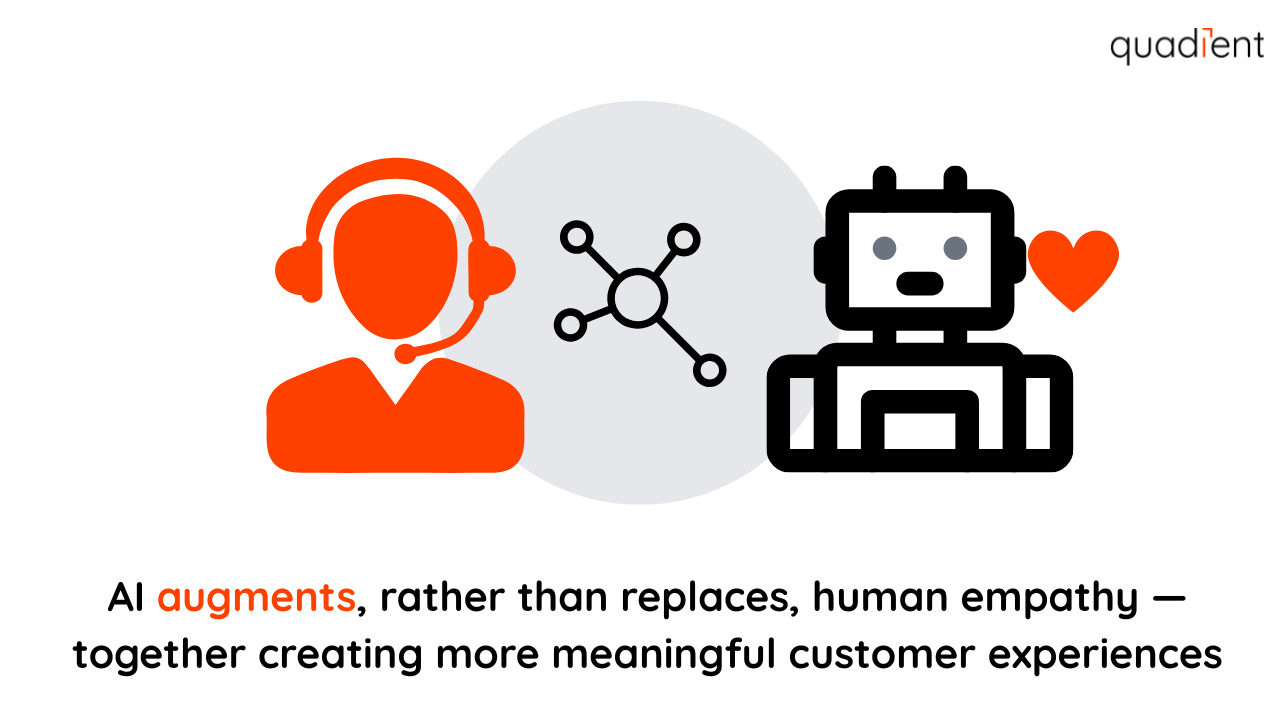
Empowering human agents with AI tools
AI provides human agents with instant insights, recommended actions, and unified customer histories. This allows them to deliver faster, more informed, and empathetic customer service.
Designing for empathy and genuine human connection
While AI handles routine interactions, human agents provide the empathy and emotional intelligence that foster deep trust and understanding. Together, they create balanced and meaningful experiences.
Navigating the future of AI in customer experience
Responsible and ethical AI
AI systems can unintentionally inherit bias from the data they are trained on. To maintain trust, organisations must commit to fairness, transparency, and inclusivity in the design of their AI solutions. Building governance frameworks and applying continuous monitoring ensures that decisions remain ethical and customer interactions feel equitable.
Overcoming security and adoption challenges
Protecting customer data is critical. Companies must implement robust security practices and comply with privacy regulations to maintain confidence in AI-driven systems. Beyond technology, adoption requires cultural change. Organisations must invest in training, take an incremental approach, and align AI projects with business goals to close the gap between optimism and execution.
Strategic roadmap to AI-powered CXM
Implementing AI in customer experience management is most effective as a phased journey rather than a single project. A practical roadmap includes three steps:
- Assess readiness and set objectives
- Evaluate current systems, data quality, and workforce capabilities
- Identify gaps and align AI use cases with strategic business goals
- Adopt incrementally and scale over time
- Start with small, high-impact projects to prove value quickly
- Use early results to build confidence and expand adoption across customer journeys
- Follow best practices for sustainable integration
- Establish strong data foundations and unified customer profiles
- Encourage cross-team collaboration and change management
- Define clear metrics to track progress and measure ROI
By approaching implementation step by step, organisations can unlock the benefits of AI while minimising risks and ensuring long-term success.
Conclusion
AI is transforming customer experience management by making it more personalised, proactive, and predictive. From predictive analytics to generative AI, businesses have access to powerful tools that enable them to improve customer interactions, streamline routine tasks, and foster long-term loyalty.
Discover how Quadient Inspire powers AI-driven customer communications. Explore our solutions or request a demo to see them in action.




